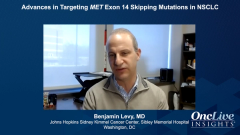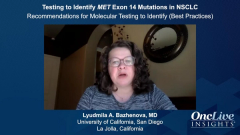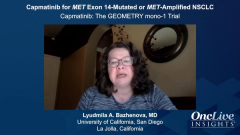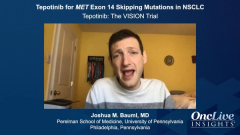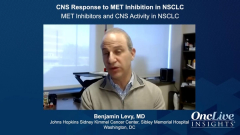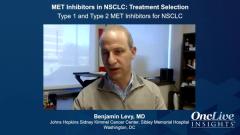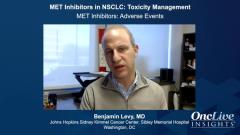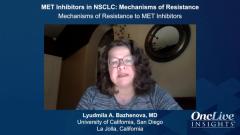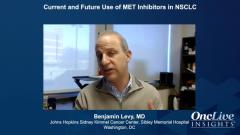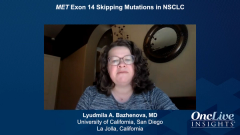
Tepotinib for MET Exon 14 Skipping Mutations in NSCLC
Implications for treating patients with non–small cell lung cancer who harbor MET exon 14 skipping mutations with tepotinib, a MET inhibitor, based on data revealed by the VISION trial.
Episodes in this series

Benjamin Levy, MD: We now have not only capmatinib as an FDA-approved drug for patients with lung cancer harboring MET exon 14 skipping mutations but also tepotinib based on the VISION trial. This is another drug that is selective and can elicit meaningful responses in patients with MET exon 14 skipping mutations. The drug also has meaningful activity in the brain, at least in a small subset of patients, and is well tolerated.
It’s an exciting time to have this many drugs in our therapeutic armamentarium to deliver to patients. It’s a testament to the science, but most important, it’s a win for our patients as we move forward with the development of drugs for this molecular niche.
Joshua M. Bauml, MD: Tepotinib is another MET TKI [tyrosine kinase inhibitor]. The VISION study looked at the efficacy of tepotinib. Investigators saw pretty good efficacy with this drug. The response rate was quite meaningful, and response was seen regardless of whether the MET exon 14 skipping alteration was identified by tissue testing or liquid testing. We’ve seen this multiple times before—however you identify a molecular driver alteration, whether using tissue or liquid, response rates are pretty similar.
The tolerability was pretty similar to what we saw with capmatinib, with MET inhibition leading to edema as the primary adverse event of concern. Tepotinib was, of course, approved, and it is a very reasonable option for patients.
Lyudmila A. Bazhenova, MD: The VISION trial gives me confidence that we now have 2 agents that seem to be effective as therapy for patients with MET exon 14 skipping mutations. The efficacy is somewhat similar. As I mentioned before when I was describing the Geometry Mono-1 trial, we saw a differential response rate between patients who have not received first-line therapy and patients who were pretreated in that specific trial. That differential response was not seen in the VISION trial.
The 1 caution I would like to overstate is that the VISION trial did have a larger number of patients. It would be important to enroll more patients who have not received first-line therapy into the capmatinib trial to confirm that the 68% response rate is true.
TRANSCRIPT EDITED FOR CLARITY


